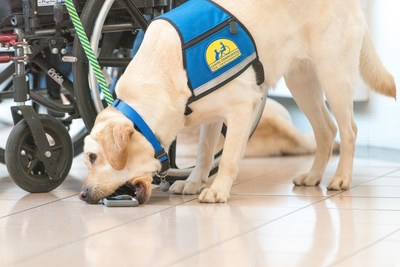What makes a successful life-changing assistance dog: brains, brawn, or behavior? A new study of thousands of Canine Companions for Independence® dogs may have some answers, identifying predictors of success in a field where the majority of dogs don’t make the cut.
|
SANTA ROSA, Calif., /PRNewswire/ -- What makes a successful life-changing assistance dog: brains, brawn, or behavior? A new study of thousands of Canine Companions for Independence® dogs may have some answers, identifying predictors of success in a field where the majority of dogs don't make the cut.
For more than a decade, Canine Companions has collected data on their population of puppies and dogs using the University of Pennsylvania's Canine Behavioral Assessment and Research Questionnaire (C-BARQ), completed by volunteer puppy raisers. The current study leverages C-BARQ data, collected when dogs are one year old, along with a standardized temperament assessment called the In-For-Training (IFT) test, which is conducted at the beginning of each dog's professional training at Canine Companions' six training centers across the country. "The ability to utilize the valuable feedback from the people that know these dogs the best—our volunteers and professional trainers—allows us to effectively evaluate the potential of each dog on a larger scale," says Emily Bray, Postdoctoral Research Associate at Canine Companions. Together with collaborators from the University of Arizona's Canine Cognition Center, researchers at Canine Companions examined data on more than 3,500 individuals across dozens of behavioral traits, including trainability, energy level, barking, and fear, as measured through both the C-BARQ and IFT. This research will pave the way for future screening of dogs and puppies to predict their success in Canine Companions' program as expertly-trained and highly-skilled assistance dogs for a person with a disability. The national nonprofit Canine Companions is the first and largest provider of assistance dogs for people with disabilities. Founded in 1975, Canine Companions assistance dogs learn 40 commands to enhance independence for people with disabilities including opening doors, retrieving dropped items, alerting to sounds in the environment and pulling manual wheelchairs. The organization has placed over 6,100 assistance dogs with children, veterans and adults with disabilities. Every assistance dog and a lifetime of ongoing follow up is provided entirely free of charge for recipients. "We are excited to explore new ways to predict service dog success through analysis of behavioral data and building predictive models," states Dr. Brenda Kennedy, Canine Companions' director of canine health and research. To learn more about science at Canine Companions, visit cci.org/science. About Canine Companions for Independence Canine Companions for Independence provides expertly-trained assistance dogs to children, veterans and adults with disabilities. Established in 1975, Canine Companions has six training centers across the country. Canine Companions is recognized worldwide for the excellence of its dogs, and the quality and longevity of the matches it makes between dogs and people. There is no charge for the dog, its training and ongoing follow-up services. For more information, call 1-800-572-BARK or visit www.cci.org.
SOURCE Canine Companions for Independence |





